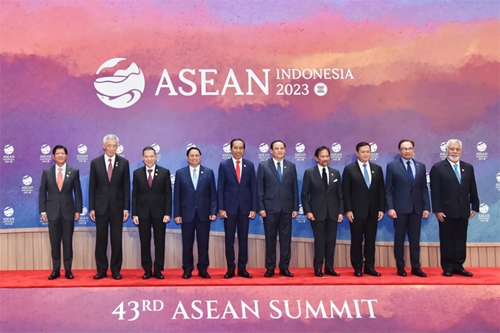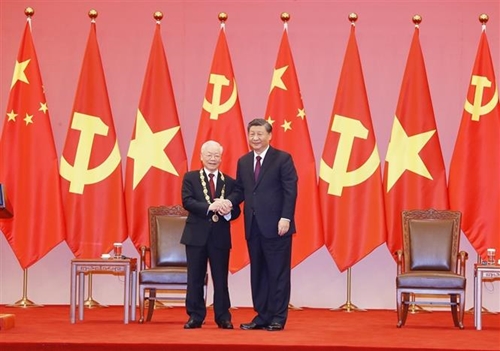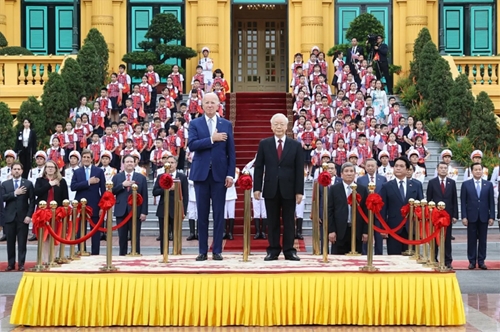Throughout the long history of the Vietnamese nation, foreign diplomacy has always played an extremely important role, contributing to not only safeguarding the country’s sovereignty and territorial integrity but also its construction and development.
Recognizing such importance given the current nation-building and development process, at the National Foreign Relations Conference for the Implementation of the Resolution of the 13th National Party Congress on December 14, 2021, Party General Secretary Nguyen Phu Trong underscored the determination to build and develop a modern foreign "bamboo diplomacy" imbued with national identity.
    |
 |
|
Prime Minister Pham Minh Chinh (fourth from left) and other heads of ASEAN member state delegates in a group photo at the opening ceremony of the 43rd ASEAN Summit |
Bamboo diplomacy has as its overarching mission: maintaining a peaceful and stable environment, seizing favorable international factors for the causes of national reform and protection, and enhancing the country's position. Vietnam's current foreign policy creatively applies the fundamental principles of Marxism-Leninism, and was built upon the foundation laid by the late President Ho Chi Minh and tailored to domestic and the global situations.
Evaluating Vietnam's unique and remarkable external relations diplomacy, known as "bamboo diplomacy," most international experts and scholars agreed that the imagery of bamboo with its "strong roots, sturdy trunk, and flexible branches" embodies the essence of Vietnam and aligns well with the country's policy of multilateralism and diversification to safeguard the interests of the nation and its people.
Layton Pike, co-founder of the Australia - Vietnam Policy Institute (AVPI) believed that bamboo evokes the image of resilience, solidarity and strength, making it an ideal metaphor for Vietnam's foreign policy of flexibility, creativity, but also steadfastness in the face of challenges and difficulties.
Abed Akbari, Director of the Tehran International Studies and Research Institute, stated that Vietnam's use of the "bamboo diplomacy" concept serves as a metaphor for resilience, flexibility and high adaptability in foreign policy.
Tomotaka Shoji, Director of the National Institute for Defense Studies’ Regional Studies Department under the Japanese Ministry of Defense, noted that the diplomacy showcases Vietnam's foreign policy is not rigid but adaptable to partners and situations, aligning well with the strategic environment and historical context. It highlights the logic of developing balanced relations with various countries.
    |
 |
|
General Secretary of the Communist Party of Vietnam Central Committee Nguyen Phu Trong (left) pays an official visit to China from October 30 to November 2, 2022. |
According to former Deputy National Security Advisor of India SD Pradhan, Vietnam's foreign policy is flexible and supple to harmonize with all poles in the multipolar world while remaining firmly tied to larger national interests, aiming for peace and economic growth for both the nation and the region. This underscores Vietnam's pro-activeness and confidence in its foreign policy and commitment to being friends with all nations.
International experts and scholars also highlighted the core principles of Vietnam's foreign policy, which revolve around effectively seizing diplomatic opportunities to ensure the maintenance of independence, safeguard national interests, and promote the citizens’ well-being.
Ruvislei González Saez, Vice President of the Cuba - Vietnam Friendship Association (CVFA), mentioned a deeply philosophical yet practical message transmitted through "bamboo diplomacy," which is solidarity, compassion, but determination and persistence in protecting the interests of the nation and its people.
Dr. Joe Pateman from the Faculty of Politics and International Relations at the U.K.'s University of Nottingham emphasizes that the "strong roots" of the bamboo in the diplomacy philosophy represent fundamental guiding principles such as national interests, independence, and self-reliance in foreign relations. These principles have deeply rooted in President Ho Chi Minh's diplomatic thinking, forming the foundation of Vietnam's foreign policy.
Vietnam has earned the trust and recognition of the international community and participated in numerous international organizations. Freshly completing its one-year term as Vice President of the 77th session of the United Nations (U.N.) General Assembly in September, Vietnam remains a member of the U.N. Human Rights Council for the 2023-2025 term, and of the U.N. International Law Commission for 2023-2027.
The nation’s active engagement in various sessions and activities within these major international organizations reflects its growing stature and role, and pro-active contribution to both bilateral and multilateral diplomacy. This also vividly showcases the achievements of "bamboo diplomacy."
According to international experts, "bamboo diplomacy" has given Vietnam an increasing role on the international stage, enabling it to maintain practical relations with major powers and ensure national interests.
    |
 |
|
U.S. President Joe Biden (left) pays a State visit to Vietnam on September 10-11, 2023, at the invitation of Party General Secretary Nguyen Phu Trong. |
The India Times noted that "bamboo diplomacy" has contributed to Vietnam's success in sustaining its independent and balanced position in relations with larger nations, thus maximizing its national interests.
Currently, Vietnam has diplomatic relations with over 190 countries worldwide, including strategic and comprehensive partnerships with 30 nations. It maintains economic ties with more than 230 countries and territories and has signed 16 free trade agreements (FTAs), including new-generation ones. Vietnam is also an active member of more than 70 important multilateral organizations and forums.
This extensive and intensive network of foreign relations has enabled Vietnam to solidify a peaceful, stable environment as well as independence, sovereignty, territorial integrity. At the same time, it has opened up numerous markets for exports and imports and attracted various sources of capital, technology, and knowledge from abroad, serving the country's industrialization and modernization.
Through the implementation of this type of diplomacy, Vietnam is increasingly asserting itself as a reliable partner and a proactive, responsible member in the process of international and regional integration. According to Wei Wei, head of the Vietnamese department under China's central TV and radio station, foreign affairs play a crucial role in altering Vietnam's international standing, gradually enhancing its reputation on the global stage.
Indonesian journalist Veeramalla Anjaiah, a senior researcher at the Center for Southeast Asian Studies (CSEAS), underscored that Vietnam is a rising star of the Indian Ocean-Pacific region and a strategic country in Southeast Asia with significant diplomatic influence in the region.
Former Cuban Ambassador to Vietnam Fredesmán Turró González affirmed that Vietnam has become a model for developing nations. The country is now an important player on the international political stage, actively engaging in and making noteworthy contributions to various international organizations and forums. It is also a trusted partner who actively participates in international and regional integration.
He attributes these results to Vietnam's smart and skillful utilization of the positive aspects of globalization without compromising its foreign policy principles, and mitigation of the impact of the process’s negative factors.
Former Deputy National Security Advisor of India SD Pradhan, meanwhile, hailed Vietnam's adept handling of various situations and its positive contributions to tackling international issues with a focus on peace. He highlighted the country’s successful chairing of two important meetings on U.N. Charter compliance and on cooperation between the U.N. and its Security Council and ASEAN. Vietnam also plays a crucial role in promoting the ASEAN Outlook on the Indo-Pacific (AOIP). These moves have significantly elevated Vietnam’s international stature.
Source: VNA